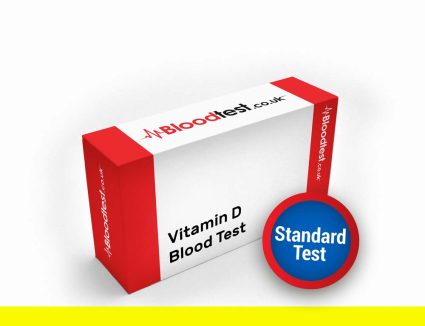Discover the Essential Advantages of a Vitamin D Blood Test for Optimal Health
When considering a vitamin D blood test in Bedford, it is crucial to understand that vitamin D is an essential nutrient with profound implications for your overall health. This vital nutrient plays a significant role in various bodily functions, including maintaining bone density and bolstering the immune system. Undertaking a vitamin D blood test in Bedford specifically aims to assess the quantity of vitamin D present in your bloodstream. Gaining knowledge about your vitamin D levels is fundamental for making informed health choices and can motivate you to take proactive measures to enhance your overall health and wellbeing.
Crucial Reasons to Evaluate Your Vitamin D Levels Regularly

The primary purpose of undergoing a vitamin D blood test in Bedford is to accurately assess the concentration of vitamin D in your blood. This assessment is essential for diagnosing deficiencies that can lead to a range of health issues, including osteoporosis, respiratory infections, and other potential complications. By comprehending your vitamin D status, healthcare professionals can provide personalised recommendations for necessary supplementation or dietary modifications that contribute to achieving optimal wellness and health.
Those at higher risk for vitamin D deficiency, particularly individuals with limited sun exposure due to their geographic location or lifestyle choices, can greatly benefit from understanding their vitamin D levels. This knowledge not only aids in preventing potential health complications associated with deficiency but also empowers individuals to make informed lifestyle decisions that can enhance their overall wellbeing.
What to Anticipate During Your Vitamin D Blood Testing Process
The procedure for a vitamin D blood test in Bedford is simple and efficient. A qualified healthcare professional will draw a small blood sample, typically from a vein in your arm. This entire process usually lasts only a few minutes and is generally well tolerated by patients, often involving minimal discomfort. After the blood sample is collected, it is sent to a laboratory for comprehensive analysis and testing.
In the laboratory, technicians will specifically measure the levels of 25-hydroxyvitamin D, which serves as the most reliable indicator of your overall vitamin D status. Results are usually available within a few days, allowing you to promptly assess your health status and make informed decisions regarding your wellbeing and necessary lifestyle adjustments.
Want to Learn More About Your Vitamin D Levels? Take Action Now!
 The Essential Role of Vitamin D in Supporting Health and Wellness
The Essential Role of Vitamin D in Supporting Health and Wellness
Vitamin D is vital for maintaining strong bone health, as it significantly aids in the absorption of calcium in the intestine. Inadequate levels of this crucial nutrient can lead to weakened bones, thereby elevating the risk of fractures, especially among older adults. Moreover, vitamin D is essential for the effective functioning of the immune system, as it helps to reduce inflammation and supports the body’s ability to fight off infections effectively.
Research indicates that maintaining adequate vitamin D levels is associated with a lower risk of chronic diseases, such as heart disease and certain types of cancers. Regular monitoring of your vitamin D levels provides critical insights that facilitate proactive health management, significantly enhancing your overall quality of life.
Who Should Consider Getting a Vitamin D Blood Test?

Specific demographics are at a heightened risk of vitamin D deficiency and should consider regular testing. This includes individuals with darker skin tones, as higher levels of melanin inhibit the skin’s ability to synthesise vitamin D from sunlight. Additionally, those living in northern latitudes, such as Bedford, may face risks due to limited sun exposure during the winter months.
Individuals with certain health conditions, like obesity, malabsorption syndromes, or chronic kidney disease, may also experience compromised vitamin D metabolism. If you identify with any of these risk factors, it is advisable to discuss a vitamin D blood test with your healthcare provider in Bedford to ensure vigilant monitoring and timely interventions for your health.
Understanding Your Vitamin D Blood Test Results
Comprehending the findings from your vitamin D blood test in Bedford is vital for effective health management. These results are typically expressed in nanomoles per litre (nmol/L). Levels falling below 25 nmol/L are classified as deficient, whereas levels between 50-125 nmol/L are generally regarded as sufficient for most individuals.
Your healthcare provider will interpret these results in relation to your overall health, age, and unique risk factors, guiding you towards appropriate actions that optimise your vitamin D levels and enhance your overall health and wellbeing.
How to Locate the Best Facility for Your Vitamin D Blood Test in Bedford
Finding a suitable facility for your vitamin D blood test in Bedford is essential to ensure a smooth and stress-free experience. Whether you prefer the comfort of a local clinic or the privacy of a private health service, Bedford offers various options tailored to meet your needs.
Researching Local Clinics and Hospitals for Your Testing Needs

Many local clinics and hospitals in Bedford provide vitamin D blood tests. These healthcare facilities are often equipped with state-of-the-art laboratories, ensuring a quick turnaround time for your test results. Being in a familiar environment can provide comfort, as medical staff can offer additional support and address any health concerns you may have during your visit.
In Bedford, reputable healthcare providers, such as the Bedford Hospital NHS Trust, offer comprehensive testing services. Scheduling an appointment is generally straightforward; simply contact the clinic or hospital directly to arrange your blood test at a time that suits you.
Benefits of Opting for Private Testing Services
If you seek a more personalised experience, private health services in Bedford offer vitamin D blood tests tailored to your individual preferences and needs. Many clinics provide flexible options, including home visits and in-clinic appointments, allowing you to select the most convenient method that fits your lifestyle.
Private testing services often promise shorter waiting times for results, which can be especially advantageous if you wish to promptly understand your vitamin D status. While these services usually incur a fee, many individuals find that the convenience and personalised care they receive justify the expense.
Utilising NHS Services for Comprehensive Vitamin D Testing
The NHS in Bedford also offers vitamin D blood tests, typically requiring a referral from your GP. This option can be ideal for individuals who prefer to receive care within the public health system. Your GP can evaluate your need for testing based on your health history, risk factors, and current symptoms to ensure appropriate care.
Obtaining a test through the NHS may involve additional steps, such as scheduling an appointment with your GP. However, this process ensures that any testing conducted is medically justified and that subsequent care seamlessly integrates into your comprehensive healthcare plan.
Essential Preparations for Your Upcoming Vitamin D Blood Test
Preparing for a vitamin D blood test in Bedford is quite straightforward, ensuring that you can undergo the procedure efficiently and with minimal stress. Knowing what to expect can significantly enhance your experience and help you feel more at ease during the process.
Important Steps to Take Before Your Blood Test
Typically, no special preparations are necessary before a vitamin D blood test in Bedford. However, it is advisable to inform your healthcare provider about any vitamins or supplements you are currently taking, especially those containing vitamin D. This information is crucial for accurately interpreting your test results and understanding their implications for your health.
If you are on medications or receiving treatment for any health conditions, it is also essential to discuss this with your doctor. They may offer specific advice tailored to your unique health circumstances, ensuring that the test results yield meaningful insights that can guide your health decisions effectively.
What to Expect During the Blood Testing Procedure
The process of a vitamin D blood test in Bedford involves a quick and uncomplicated blood draw. You will typically be seated comfortably while a qualified healthcare professional prepares the necessary equipment. After cleaning the area around your arm, a small needle will be inserted to collect the blood sample efficiently.
Many individuals find the experience largely painless, with any discomfort described as a mild pinch. The entire procedure usually takes only a few minutes, allowing you to return to your daily routines with minimal interruptions and discomfort.
Your Post-Test Expectations After the Vitamin D Blood Test
After your vitamin D blood test in Bedford, you can immediately resume your regular activities. Typically, there are no restrictions on your diet or exercise following the test, making it a convenient option for individuals with busy lifestyles.
You can expect to receive your results within a few days, either during a follow-up appointment or through a secure online portal, depending on the facility where the test was conducted. This prompt feedback allows you to take timely action if your vitamin D levels are discovered to be deficient.
Understanding and Interpreting Your Vitamin D Blood Test Results Effectively
Receiving your results from a vitamin D blood test in Bedford is just the beginning; comprehending what those results signify is essential for effective health management. Here’s how to interpret your findings accurately and meaningfully.
Decoding the Significance of Your Vitamin D Levels
The outcomes of your vitamin D blood test in Bedford will typically be expressed in nanomoles per litre (nmol/L). Understanding these figures is vital for grasping your vitamin D status. Generally, levels below 25 nmol/L indicate a deficiency that may require immediate intervention to prevent health complications.
Conversely, levels ranging from 50 to 125 nmol/L are deemed adequate for most individuals, supporting optimal bone health, immune function, and overall wellbeing. Your healthcare provider will assist you in contextualising these numbers, taking into account your age, health status, and any specific concerns you may have about your health.
What Steps to Take If You Are Found to Be Deficient in Vitamin D
If your vitamin D blood test in Bedford reveals a deficiency, it is critical to take appropriate action. Your doctor may recommend vitamin D supplements, dietary changes, or increased sun exposure to rectify your deficiency effectively. The specific type and dosage of supplements will depend on the severity of your deficiency and any underlying health conditions you may have.
Incorporating foods rich in vitamin D into your diet—such as fatty fish, fortified dairy products, and eggs—can also help improve your levels. Additionally, spending more time outdoors during sunnier months can naturally enhance your vitamin D production, leading to better health outcomes and overall wellbeing.
The Importance of Regularly Monitoring Your Vitamin D Levels
Regular examination of your vitamin D levels is advisable, particularly if you have previously experienced deficiency or are making adjustments to your diet or supplementation. Monitoring enables you and your healthcare provider to track your progress and adapt your treatment plan as necessary to maintain optimal health.
By routinely assessing your vitamin D status, you can ensure that your levels remain within the optimal range, thereby supporting your overall health and wellbeing for the long term.
Factors That Influence Your Vitamin D Levels
Several factors can affect your vitamin D levels, making it essential to consider these when interpreting test results. Age is a significant factor; older adults often require more vitamin D due to decreased skin synthesis and absorption efficiency. Understanding this can help tailor your health strategies accordingly.
Skin pigmentation also plays a role in vitamin D production—individuals with darker skin possess higher levels of melanin, which can hinder the skin’s ability to generate vitamin D from sunlight. Geographical location is another factor affecting sunlight exposure, particularly in northern climates where winter months can significantly limit vitamin D synthesis.
Seasonal variations can also impact your vitamin D levels, with many individuals experiencing lower levels during winter. Being aware of these factors can help you and your healthcare provider formulate a comprehensive plan for maintaining optimal vitamin D status throughout the year.
Understanding the Financial Aspects of Vitamin D Blood Tests in Bedford
Gaining insight into the costs associated with a vitamin D blood test in Bedford is crucial for managing your healthcare expenses effectively. Prices may vary based on the type of testing service you choose, whether through the NHS or private providers.
Costs Associated with NHS Testing Services
Tests conducted through the NHS are generally free of charge, provided you have a referral from your GP. This system ensures that individuals requiring testing due to medical conditions or specific risk factors can access essential services without incurring financial burdens.
However, it’s important to note that some NHS services may incur additional costs, such as extra consultations or follow-up appointments. Always confirm with your GP about any potential costs associated with requesting a vitamin D blood test in Bedford to avoid surprises.
Expenses for Private Testing Services
For those opting for private testing, the cost of a vitamin D blood test in Bedford can range from £30 to £100, depending on the provider and whether the service includes a consultation. Private testing often provides quicker results and more personalised care, which many individuals find beneficial for their health management.
Before committing to a private test, it is advisable to compare prices and services from different clinics. Some may offer packages that include additional health assessments, potentially providing extra value to your investment in your health.
Exploring Insurance Coverage for Vitamin D Testing
If you have health insurance, it is wise to verify with your provider whether your coverage includes vitamin D blood tests. Some policies may cover part or all of the costs associated with testing, particularly if it is deemed medically necessary for your health.
Be aware that insurance coverage can vary significantly based on the specifics of your policy, including whether you choose NHS or private services. Understanding your coverage can assist you in making informed decisions regarding your healthcare finances and options.
Pricing at Local Clinics for Vitamin D Testing
Local clinics in Bedford may offer vitamin D blood tests at varying prices, typically ranging from £25 to £75. These clinics often provide a convenient option for individuals seeking prompt testing without the need for a GP referral, making healthcare access easier.
When selecting a local clinic, consider not only the cost but also the reputation and quality of care offered. Reading reviews and seeking recommendations can help ensure you choose a facility that effectively meets your healthcare needs and expectations.
The Benefits of Regular Vitamin D Testing for Enhanced Health
Regular testing for a vitamin D blood test in Bedford can yield substantial health benefits, providing invaluable insights that support proactive wellness strategies. Below are some key advantages associated with maintaining regular testing for your vitamin D levels.
Proactively Preventing Vitamin D Deficiency Through Regular Testing
One of the most compelling reasons to undergo regular vitamin D blood tests is to proactively prevent deficiency. Continuous monitoring allows you to identify low levels before they escalate into health complications, such as osteoporosis, which can severely impact your quality of life and wellbeing.
A deficiency in vitamin D can predispose individuals to various health issues, including weakened bones and increased susceptibility to infections. By routinely assessing your vitamin D status, you can take proactive measures to maintain optimal health and avert serious complications that may arise from deficiency.
Enhancing Your Overall Health and Wellbeing with Adequate Vitamin D
Maintaining sufficient vitamin D levels can contribute to improved overall health. Adequate vitamin D supports immune function and may positively influence mood, thereby reducing the risk of depression and anxiety disorders that can affect daily living.
Research indicates that individuals with optimal vitamin D levels are less susceptible to chronic illnesses. Regular testing can help you fine-tune your supplementation and dietary choices, ensuring that you consistently meet your health needs and support your body’s requirements effectively.
Creating Tailored Treatment Plans for Your Unique Health Needs
Regular testing facilitates the creation of personalised treatment plans based on your specific health requirements. If you are found to be deficient, healthcare providers can recommend targeted interventions that align with your lifestyle, such as precise supplementation strategies or dietary modifications that can enhance your vitamin D levels.
By understanding your unique health needs, you can adopt a more proactive approach to managing your health, ultimately leading to better health outcomes and an enhanced quality of life.
Effectively Tracking Your Progress Over Time with Continuous Testing
Frequent testing of your vitamin D levels allows you to monitor the effectiveness of any adjustments you’ve made, whether regarding supplementation, dietary choices, or lifestyle modifications. This ongoing evaluation enables you to adapt your strategies as needed to ensure optimal health and wellbeing.
Regular monitoring provides peace of mind, knowing that you are actively managing your health and making informed choices tailored to your body’s unique needs and health conditions.
Your Most Common Questions Addressed
What is a vitamin D blood test, and why is it important?
A vitamin D blood test measures the level of vitamin D in your blood, helping to determine if you have a deficiency or if your levels are sufficient for optimal health and wellbeing.
Why might I require a vitamin D blood test?
You may need this test if you exhibit risk factors for deficiency, such as limited sun exposure, specific medical conditions, or symptoms of deficiency, including fatigue, muscle weakness, or bone pain.
How is the vitamin D blood test conducted?
The test involves a straightforward blood draw from your arm, which is then sent to a laboratory for analysis. The procedure is quick and typically results in minimal discomfort, making it suitable for most individuals.
What do the results of the test indicate?
Results are reported in nanomoles per litre (nmol/L). Levels below 25 nmol/L indicate a deficiency, while levels between 50 and 125 nmol/L are considered adequate for most individuals, supporting optimal health.
How can I enhance my vitamin D levels effectively?
To improve your levels, consider taking vitamin D supplements, making dietary changes (such as consuming fatty fish and foods fortified with vitamin D), and increasing your sun exposure during the warmer months when sunlight is more abundant.
Are there any risks associated with the vitamin D blood test?
The vitamin D blood test is generally safe, with minimal risks involved. Some individuals may experience minor bruising or discomfort at the site of the blood draw, but serious complications are rare.
How often should I undergo testing for vitamin D levels?
The frequency of testing depends on individual risk factors and medical advice. Those at risk of deficiency may benefit from testing every 6-12 months to ensure adequate levels are maintained.
Can I obtain a vitamin D blood test through the NHS?
Yes, you can receive a vitamin D blood test through the NHS, typically requiring a referral from your GP to ensure you receive appropriate care.
What are the costs associated with a vitamin D blood test in Bedford?
Costs vary; NHS tests are free with a referral, while private tests can range from £30 to £100, depending on the provider and services included in the testing.
Is there insurance coverage available for vitamin D testing?
Many health insurance plans cover vitamin D testing, but coverage details can vary, so it’s advisable to check with your provider beforehand to understand your benefits.
Connect with us on Facebook for more updates!
This Article Was First Found On https://bloodtest.co.uk
The Article Vitamin D Blood Test: A Local Guide for Bedford Residents Was Found On https://limitsofstrategy.com



